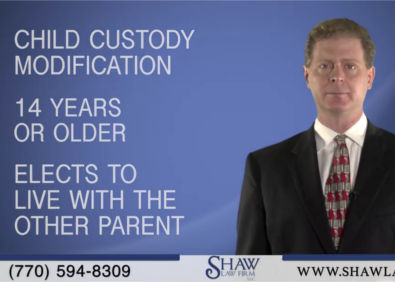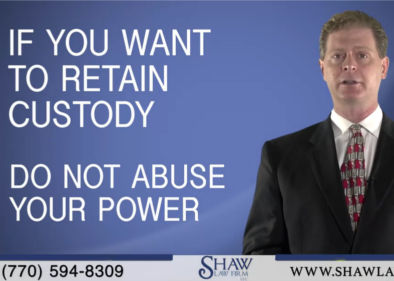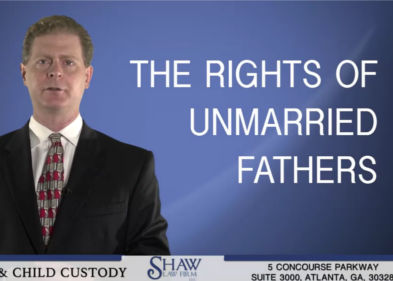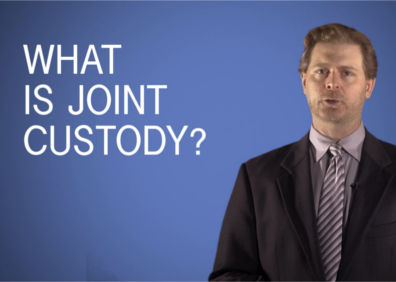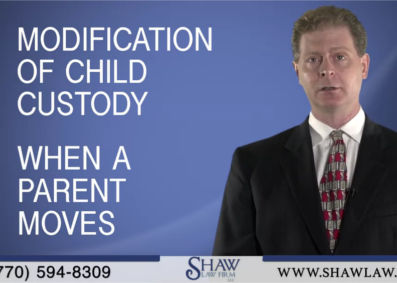Retain Custody of Children in Atlanta
Hello. My name is Scott Shaw. I’m the founder of Shaw Law Firm, LLC, a law firm I founded in 1995. And today I’m here to talk with you about, if you want to retain custody of your children, do not abuse your power as a primary custodian.
Two recent cases by the Georgia court of appeals and the Georgia supreme court, confirms what has long been common sense advice, but that is not so commonly followed. If you want to keep custody of your children, don’t abuse your authority as the children’s primary parent.
Legal Custody Case Example
The first case I’m going to discuss is close and dear to me as it is my case. It’s a case that started in 2011. My client is the father, and the mother committed act after act that demean the father. From little things like, at the child’s daycare, each child hung a picture of their family. This child’s picture however consisted of mom and her boyfriend, large and in the center as portrait pictures are, with the words Mom and big daddy scribbled underneath it. And then her biological father in a small three by five, stuck in the side of the photo with the words Little daddy scribbled under it. To much bigger issues, some of them just plain stupid that she did. And this case became one of the most vile I’ve ever worked. The long and short, the mother in this case lost custody of her little girl. This mother is a successful professional. She’ll go skiing in Utah several days a month just on a whim, and she could afford to put her daughter in a private school, versus dad who could not afford to even think of doing anything of that sort.
The court however found that the only antidote to the alienating behaviors of the mother, is to allow the child to be immersed in the father’s household. In separate videos I’ve spoken about how to win child custody cases, whether father or mother. And you do so by following the law and building your case towards the law. The law of child custody in the state of Georgia is 17 different elements, and one element is to facilitate and encourage a close and continuing relationship with the other parent, consistent with the best interest of the child. And this is the exact element that the appeal court decided in upholding my client’s award of child custody of his daughter.
Long and short, had mom not committed these acts she would still have her daughter. In addition to that, the court awarded my client more than $10,000 in attorney fees, because the mother continued with abusive and frivolous motions and litigation. Her attorney argued any and everything under the sun. And all it gained her were enormous attorneys fees, liability for more than $10,000 for my client’s fees, potential for more than 40,000 more in fees to my client, and loss of her daughter. And attorney who refuses to objectively evaluate their client, and handle their case accordingly instead of like a pit bull, is not doing his or her client any favors as this case demonstrates.
Modifying Primary Custody
A good attorney reads the case and does not blindly make arguments without concern for the consequences, or ignoring their client’s own behavior. In yet another case evidencing this principle, this time the father losing custody to the mother in Blue versus Hamons. The trial court modified custody from the father, who had primary custody, to the mother. The basis for the decision was that the father had willfully acted to withhold visitation, and has continually denied the mother overnight visitation with no good reason. In addition, the father failed to notify his son’s school that the mother had equal rights to the information.
These circumstances were sufficient for the court to find that a change of custody was warranted. This is a fact pattern that is unfortunately not rare. But these sort of cases can be very frustrating. Usually it is the father who is denied visitation. A particular no in this case, was the father’s failure to give the mother equal rights with their child’s school. That is objective and discoverable evidence, that becomes impossible for the father in this particular case to explain a way. In my experience I have found this sort of evidence to be particularly persuasive, and can enrage a judge.
Keeping Child Custody
If you want to keep custody of your children, list the other parent on school and other forms. This evidence alone has been critical in winning many child custody modification cases. I do not know if this case reached a level of true parental alienation, that can often exist in such fact patterns like in the first case I discussed. But another thing to note in this case, is that the mother in this case, despite what appears to be good evidence of parental alienation, did not even need to get to the issue of parental alienation to win back custody of her child. The father’s behavior of abusing his power over visitation and information from the school by itself was enough.
The other thing to know in these cases, is that you have to prove your case. Hearsay evidence is not sufficient to prove any fact. We need to gather your evidence in a legal manner, so that it’s admissible at trial and persuasive to the court. I am Scott Shaw. I will be happy to take your phone calls and inquiries. Thank you.
By: Scott Shaw

